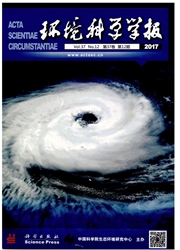

 中文摘要:
中文摘要:
在三峡库区最大次级河流嘉陵江现场采集水样,并进行藻类生长试验,探讨了藻类在氮磷比、光照强度和流速条件下的聚集行为.在不同TN/TP和光照强度的静水表层中主要藻类为蓝、绿藻,优势种为蓝藻门的水华微囊藻,总体上蓝藻的聚集参数θ大于绿藻;在流速大于0.03m·s^-1的动态水体中蓝绿藻聚集参数迅速下降,优势藻类不再明显.对水质的生态学评价结果表明,水华微囊藻聚集参数θ与生物多样性指数d拟合的可决系数R2在0.81以上,反映出优势藻聚集能力与水体环境质量的反比关系.作为水质污染和营养水平评价依据的指数d不能直接表征水华污染状态,因此,在参数θ的基础上构建了描述水华污染状态的函数G,将函数G应用于对实验结果和实际流域水华污染的评价,结果表明,水华状态函数G确实能有效和半定量刻划水华污染程度.
 英文摘要:
英文摘要:
Algae species were isolated from water samples collected from the Jialing River-the largest branch river in the Three-Gorges reservoir region.Experiments were carried out to investigate the effects of TN/TP ratio,light intensity and flow velocity on the growth of the algae.Chlorophyta and Cyanophyta are the main algae types in static water,regardless of the TN/TP ratio and light intensity,and the dominant algae species is Microcystis flos-aquae of the Chlorophyta.In general,the clustering parameter θ of Chlorophyta is larger than that of Cyanophyta.However,the clustering parameter of both Chlorophyta and Cyanophyta decreases rapidly and the dominance of Microcystis flos-aquae starts to disappear when the flow velocity in the dynamic water is over 0.03 m · s^-1.Ecological assessment of the water quality reveals that for all cases the correlation coefficient(R2)between the biodiversity index(d)and the clustering parameter(θ)is greater than 0.81,and the water quality is inversely proportional to the clustering ability of the dominant algae species.Since the index d is an assessment criterion of water quality as well as the nutrient level,and cannot be directly used to evaluate an algae bloom,a function(G)was constructed on the basis of the clustering parameter θ.The function G is used to assess the lab data and the actual water pollution in the river.The results indicate that G can effectively represent the state of the algal bloom in a semi-quantitative way.
 同期刊论文项目
同期刊论文项目
 同项目期刊论文
同项目期刊论文
 期刊信息
期刊信息
